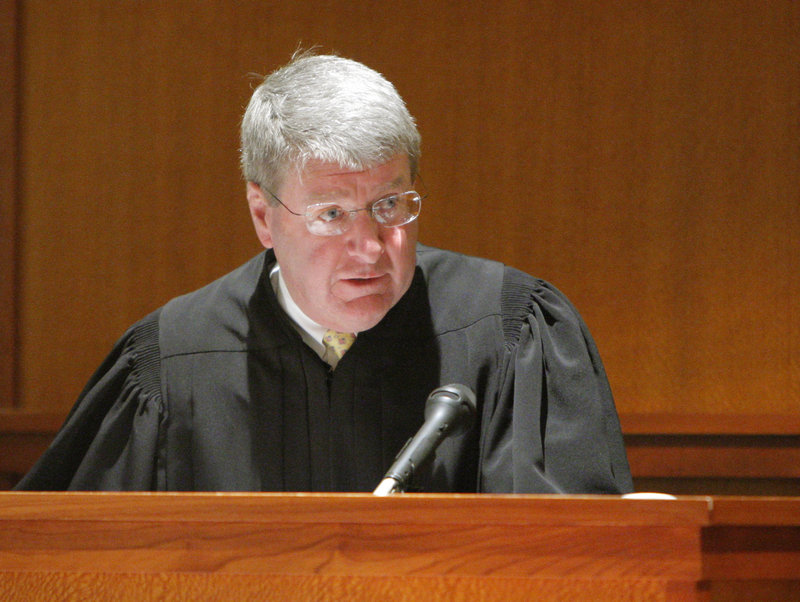Portland, Maine – If the case in front of him called for tough punishment, Superior Court Justice Robert Crowley did not hesitate to deliver.
If it called for compassion and a second chance, he could deliver that as well.
And if a jury seemed too anxious during a grueling trial, it was Crowley who found the right words to inject some humor into the courtroom.
Setting aside his professional achievements — most notably his leadership in bringing settlement conferences into Maine’s court system and helping to develop the state’s first drug court — it is Crowley’s distinct personality that made him a favorite of colleagues and lawyers during his 28-year career as a judge, which ends Tuesday.
“One of the things that Bob brings to the job is a real balance,” said Maine’s Chief Justice Leigh Saufley. “He does know how to be humorous and human in the courtroom, and at the same time, serious matters are handled very seriously.
“Bob Crowley represents the very best of judging, and he has been a role model and a mentor for many a judge,” Saufley said.
While the 64-year-old Crowley is ready to leave the bench, the Kennebunk resident is certainly not ready to retire. And he will waste no time getting adjusted to his new job. Crowley starts Wednesday as a lawyer with the firm Kelly, Remmel and Zimmerman.
The firm on Exchange Street has 11 lawyers, including a close friend of Crowley’s father and two of the judge’s former law clerks. Crowley will specialize in mediation, sometimes called “private judging.” The role is similar to the one he has often played as a Superior Court justice. He will spend much of his time listening to the parties involved in a dispute, he will analyze the risks on both sides and then will urge them to move toward compromise.
Crowley said he wanted to return to the private practice of law this year, instead of waiting until his term as a judge expires in five years, because he has the energy and good health to take on this challenge. He has received encouragement from his wife, Ginny; daughters Beth and Kate; and son, Paul.
“This is a great job, every day it’s fun to come to work. I’m not burned out or bored,” he said during an interview last week at his chambers at Cumberland County Superior Court.
“With any job, there comes a time when you move on.
“It’s a nice firm and a nice size,” Crowley said of Kelly, Remmel and Zimmerman. “I needed to stay in Portland, I felt. My professional center of gravity is here.”
U.S. Attorney for Maine Thomas Delahanty II, a longtime Superior Court justice who is related to Crowley, said one of the judge’s top achievements was the establishment of judicial settlement conferences.
In those conferences, lawyers on both sides of a case meet with a judge to discuss the strengths and weaknesses of their positions and to explore whether there is mutual ground. The general idea is to avoid the costs and time expended for a trial, while reaching a resolution that is acceptable to both parties.
“He is able to get results in some of the toughest cases,” Delahanty said. “He has been a judge that people seek out, which is a compliment to anybody who is on the bench.”
The conferences were created to address civil cases, but they are also now required in criminal cases. Along with his friends Superior Court Justice Roland Cole and Sally Bourget, clerk of the Superior Court in Portland, Crowley developed that rule earlier this decade.
“He has been a mentor as well as a friend, who supported my staff and myself throughout our working relationship,” Bourget said. “We have had many changes within the Judicial Branch and through them all Justice Crowley has maintained his wonderful sense of humor, his sense of fairness, a positive state of mind. He will be greatly missed by all of us.”
Neale Duffett, a Portland defense lawyer, said Crowley has the respect of the private bar.
“I’ve been working in this system for a long time, and he is one of the best Superior Court justices that we have ever worked with,” Duffett said. “He is personable, approachable, very intelligent. His knowledge of the rules and procedures is second to none.”
Crowley’s father was a lawyer and municipal judge for many years in Biddeford.
After earning his law degree from Georgetown University Law Center in 1971, Crowley worked for the Boston Legal Aid Society for two years and then joined his father’s firm, Crowley, Crowley & Smith, in Biddeford and Kennebunk.
In 1982 he was elected as the probate judge for York County, where he served until 1987 when he was nominated by Gov. John McKernan to become a District Court judge. Crowley has served as a Superior Court justice since 1993, and has presided over many high-profile murder cases, including the case of Christian Nielsen, a 31-year-old cook who killed four people in the Bethel area over Labor Day weekend in 2006.
As Crowley was packing up his office last week, he took a moment to look at a letter from Nielsen’s father. Charlie Nielsen thanked the judge for treating his son and the family with dignity, despite the horrific nature of the crime. At the end of a tough case, the letter meant a lot to him, Crowley said.
Crowley said most of all he will miss the daily interaction with the people at the courthouse. The clerks, court officers, law clerks and other judges are “absolutely first-rate,” he said.
“I’ll miss the people. That’s the obvious answer, but everyone here is special,” he said. “When I leave it is going to be different, and I’m sorry about that.”
Staff Writer Trevor Maxwell can be contacted at 791-6451 or at:
tmaxwell@pressherald.com
Send questions/comments to the editors.



Comments are no longer available on this story